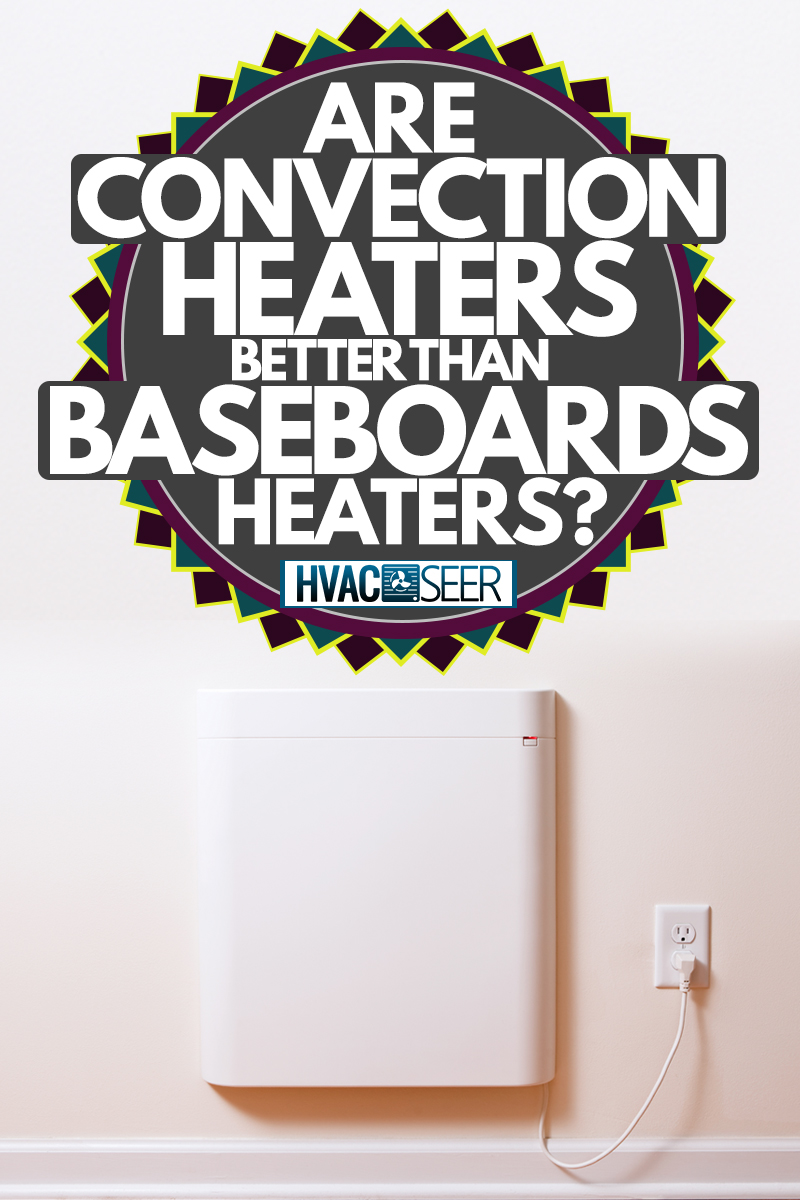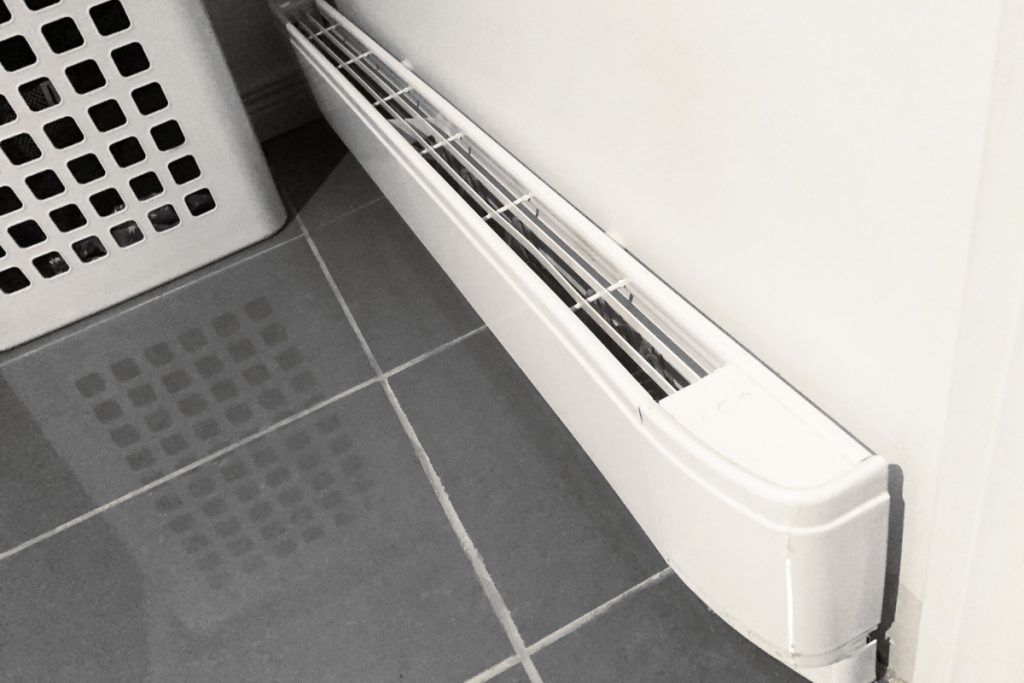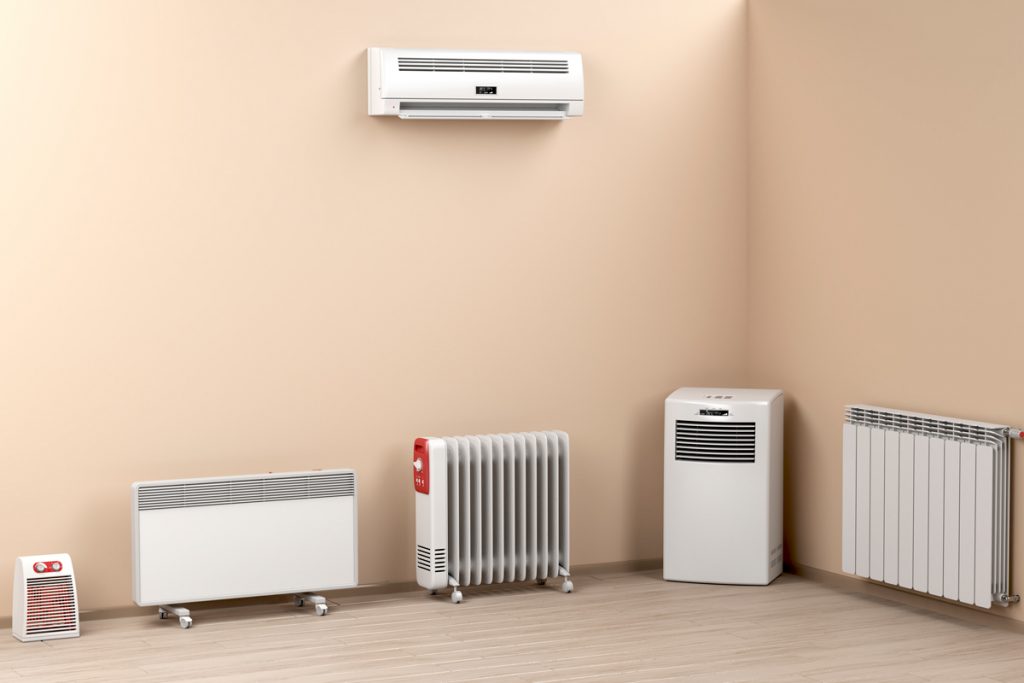Planning to install baseboard heaters in the rooms of your home? Thinking about buying a convection heater to stay warm this winter? Whether you're taking on a new home remodeling project or simply exploring your options for electric heat come winter, we've gathered useful information about baseboard heaters and convection heaters to help you make the best decision. In this post, we'll discuss the better option when it comes to baseboard versus convection heaters.
Neither baseboard nor convection heaters are necessarily better or worse than the other, and both can be extremely effective at keeping your energy bills low in the winter. Both heaters have their own pros and cons, including the following:
Convection Heaters
Pros
- Portability
- Provide even heating
- Most come with customizable settings
- Quiet operation
Cons
- Fast heat loss
- Some models can be noisy
- Can be inaccurate
- Potentially trigger allergies
- Less effective at times
Baseboard Heaters
Pros
- Provides zonal room heating
- Easy relocation abilities
- No moving parts
- Easy install/removal
Cons
- Takes up space
- Requires cleaning
- Improper placement can cause issues
- Long curtains can obstruct heat
- Corridors and hallways won't heat
To determine which heater type is the best for a supplemental heating source, you want to answer whether you will use the heater for an entire room or a small area. Also, determine whether the heater will be used for one room or multiple. Knowing your heating requirements upfront can lead you to the best heater for your preferences. Let's take a closer look at the pros and cons of both types of heaters.

Convection Heaters
When attempting to heat a small room or just a small area inside a room, it's better to go with a convection heater than a baseboard heater. Why? Most convection heaters are portable and can be plugged in wherever there is a wall outlet; they're also best for infrequent heating (running them constantly can get costly).
Convection Heater Pros
Portability
Convection heaters can easily be mounted in small or irregular spaces, at the base of stairwells, or up high to allow for versatile ways to warm up a room.
Check out this convection heater on Amazon.
Provide Even Heating
One of the biggest benefits of using convection heaters is that they can offer even heating to a room and eliminate the chance of cold spots and drafty areas. This is because the air they warm will naturally gravitate away from the heater and rise to the top of a room, spreading out as it comes down.
Most Come With Customizable Settings
Since convection heaters are typically installed inside separate rooms, you can usually customize your temperature needs based on where you are in your house and the specific temperature in that room. It also ensures that you aren't wasting any unnecessary energy by heating or overheating unoccupied rooms, thus keeping your energy bill affordable.
Quiet Operation
Unlike forced air systems, convection heaters don't require a home to have ductwork to operate, which allows them to do so fairly quietly. Homeowners can enjoy their air heating capabilities throughout the day and during the night without having to hear the constant buzzing from the airflow of an HVAC system or clicking noises when the system turns on and off (which can wake you up if you're a light sleeper).
Convection Heater Cons
Quick Heat Loss
Convection heaters rely on warm air to spread naturally inside a room. However, if the room has any gaps in its door or window areas or bad insulation overall, the heat loss can be swift.
Some Models Can Be Noisy
Some convection heaters come equipped with a fan. And while there is normally some level of noise associated with these heaters, though minimal, the ones with fans are typically louder during operation.
Can be Inaccurate
Except for expensive high-end heater models, your average convection heater will not be the best at keeping the temperature constant in a room. One of the biggest complaints about convection heaters from homeowners is that they are either too hot or aren't hot enough, requiring the adjustment of settings more often than ideal.
Sometimes Trigger Allergies
Since convection heaters don't force air through a filter, particles such as pollen, dust, and other degrees can trigger allergic reactions. (Note: This can usually be offset with regular cleaning.)
Are Less Effective At Times
These heaters are not the most effective option for heating large spaces or areas because the warmth will naturally disperse within minutes. When used in a large home, they typically won't provide a sufficient amount of heat compared to that of traditional central heating systems.
Baseboard Heaters

If you want to heat a larger space or area, such as a basement or living room, a baseboard heater is definitely a better option. Baseboard heaters come in two types: convection and hydronic, both of which are energy efficient and work well when heating large areas or multiple rooms. Baseboard heaters are great at maintaining different temperatures in multiple rooms, all while keeping the home's main heating source's temperature setting low.
Baseboard Heating Pros
Provide Zonal Room Heating
Check out this baseboard heater on Amazon.
Baseboard heaters are great for heating individual rooms. While some heater unit models may be tied to one central thermostat, they can be controlled locally for the most part. For example, if you have rooms in your home that won't be occupied as much during colder months, you can save money by keeping the temperature in these rooms cooler.
Easy Relocation Abilities
Baseboard heaters can easily be relocated to a different room or area of a home. If you decide that you want to either reposition them or relocate them to a frequently used room, they can be unmounted in a matter of minutes. Also, adding a new additional unit to a room is relatively inexpensive, though you will need a licensed electrician if you are planning to increase your home's electrical load.
No Moving Parts
One of the main advantages of baseboard heaters is that they don't contain any moving parts inside their operating system. This means that the heating system is usually less prone to component failure than traditional central heating systems. It also means that they require less maintenance.
Easy Install/Removal
If you are a DIY enthusiast, you'll be happy to know that installing a new baseboard heater in your home is relatively easy. It is recommended to have a licensed electrician do this for you. However, with proper instruction and minor electrical skills/knowledge, you can accomplish this task yourself within two to three hours.
Baseboard Heating Cons
Take Up Space
Though not particularly bulky, baseboard heaters do take up extra space in a room. And because they require extended areas along the length of a wall, they can limit the placement options for furniture and other types of home decor.
Require Cleaning
Baseboard heaters operate more efficiently when kept clean and free of dust. When these particles settle on the heater's fins, they can begin to block and restrict its airflow. It's generally recommended to wipe the heater down every month or so to keep it well-maintained.
Improper Placement Can Cause Issues
If a baseboard heater has been installed incorrectly, it will not heat as efficiently. Also, if the flooring is changed in a room (such as added carpeting), repositioning of the baseboard heaters will need to be considered to ensure that they can operate effectively.
Long Curtains Can Obstruct Heat
Since baseboard heaters are usually placed below window sills, it's common for long hanging drapes to get in the way of heat distribution. If the drapes in a room extend down and cover the top of the baseboard heater (or are even within 5- to 6-inches of its top), its heating capabilities can be obstructed.
Corridors and Hallways Won't Heat
Baseboard heaters work best to heat one individual space, meaning that areas outside of the room they are located in will typically be cooler If they don't have their own heat source.
Are wall heaters more efficient than baseboard heaters?

Wall heaters are not more efficient than baseboard heaters and use approximately the same amount of electricity as baseboard heaters (and in the same way as baseboard heaters). However, wall heaters can heat a room fairly quickly, as they utilize a fan to circulate air throughout the room. Baseboard heaters, on the other hand, rely on a natural process of heat convection.
Note that you may see energy-savings if you're looking to use wall heaters to heat rooms for short periods of time or infrequently. When deciding which heater type is the best option for your home, it comes down to your individual preference and the need for the specific room you're looking to warm up.
Check out this wall heater on Amazon.
Additional Considerations For Wall and Baseboard Heaters
Baseboard heaters may be a better option if you are looking for a heating option that's more on the quiet side, as the fan from wall heaters will make a slight noise (though less than that of a typical refrigerator). Also, baseboard heaters tend to last about 20-years, while wall heaters typically last around 8- to 12-years. Wall heaters also require less space and can give you more flexibility with furniture arrangement options.
So to say, if you were looking to heat a small area such as a bathroom, a wall heater might be the better choice, depending on your installation capabilities in that particular room.
Can I leave a convector heater on overnight?
It's generally not recommended to leave a convection heater (or any space heater) on overnight or left unattended. Due to the level of heat that they create, convection heaters come with the risk of fire hazards, electrocution accidents, and burns. If you do plan on leaving a convection heater overnight, it's best to activate the auto shut-off or timer option, ensure that it's located far from any flammable objects or furniture, and make sure that there is a functional smoke/fire detector in the room.
What is the most energy-efficient baseboard heater?
Baseboard heating, at its very core, is a very efficient heating option. However, heaters that come equipped with new and innovative features such as automatic shut-off sensors, enhanced thermal technology, and advanced temperature control settings can maximize efficiency.
Is a fan heater better than a convector heater?
Convection heaters and fan heaters are relatively equal in their ability to give off a certain level of heat. However, the main difference between the two heater types is how they actually emit heat. Convection heaters work by using the convection process to heat an entire room evenly and gradually. Fan heaters operate by blowing heated air in a specific direction to warm up a particular space within a room.
If you were looking to warm up quickly in a small space, a fan heater would be a good option. However, if you are looking to heat an entire room evenly, convection heaters are a better pick.
Check out this fn heater on Amazon.
Is it worth replacing old baseboard heaters?
The average lifespan of a baseboard heater is about 20-years or so. If the baseboard heater is no longer operable, and you prefer it as your supplemental heating system, it's absolutely worth replacing. However, it's important to note that new baseboard heaters aren't necessarily more energy efficient than older models, as they use the same heating principle to pass electric currents through heat resistors.
If anything, they may come equipped with better thermostats and shut off sensors that allow maximum efficiency. Any major difference in the level of efficiency provided by a baseboard heater will depend more on how the heater is used.
Wrapping Things Up
As you can see, there are a few different factors to consider when determining whether or not a convection heater will work better for your home when compared to a baseboard heater. Hopefully, this guide has provided you with the information that you need to make the best decision for your heater purchase.
Before you go, be sure to check out some of our other related HVAC posts:
https://hvacseer.com/can-heated-floors-go-under-carpet/
https://hvacseer.com/turn-down-radiant-heat-at-night/




